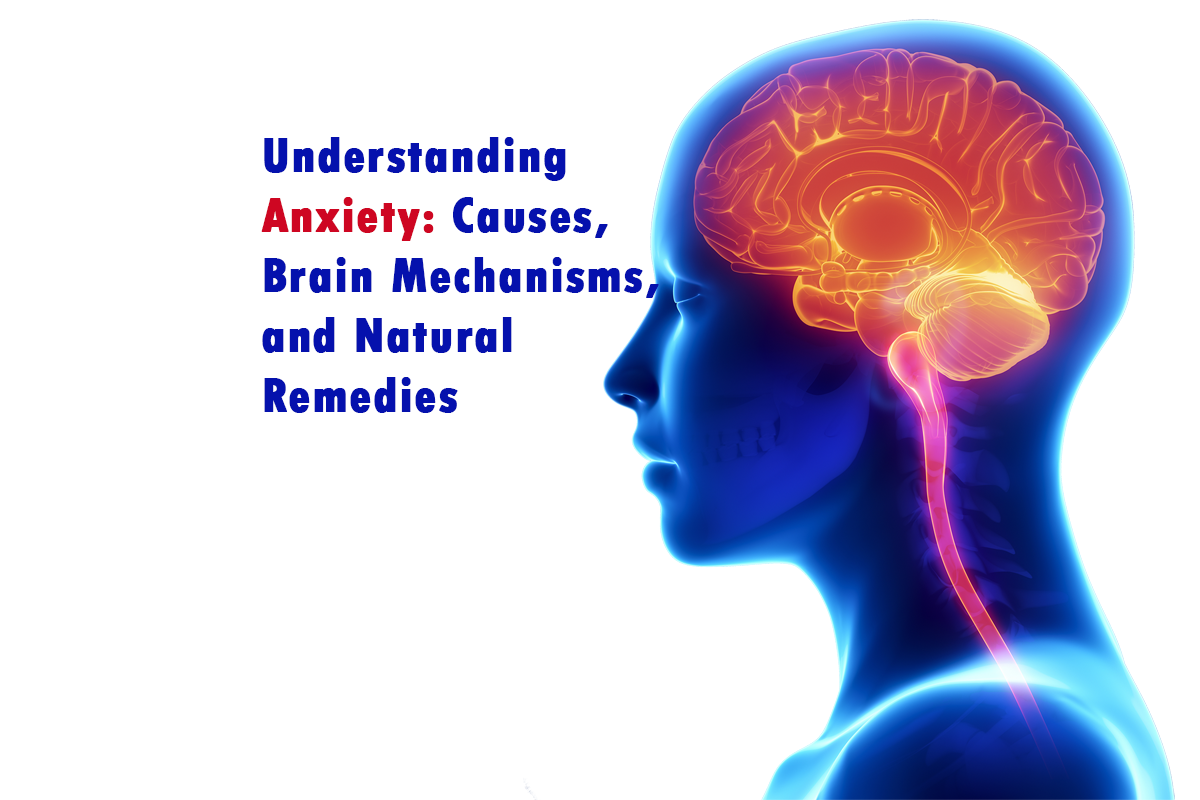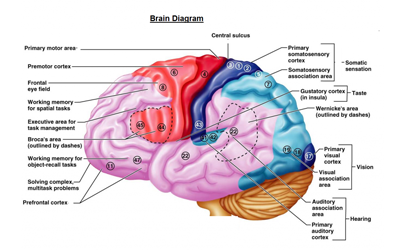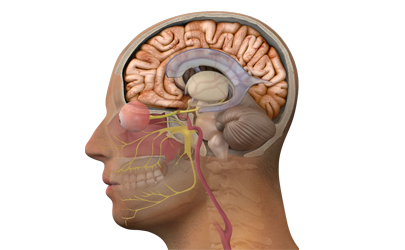
Understanding Anxiety: Introduction
Anxiety is a natural response to stress, but when it becomes chronic, it can interfere with daily life. Understanding the causes, how the brain reacts, and natural ways to manage anxiety can help in developing effective coping strategies.
What Causes Anxiety?
Anxiety can stem from various factors, including:
- Genetics – A family history of anxiety disorders increases susceptibility.
- Brain Chemistry – Imbalances in neurotransmitters like serotonin, GABA, and dopamine.
- Environmental Stress – Trauma, work pressure, financial issues, or relationship problems.
- Medical Conditions – Thyroid disorders, heart disease, or chronic illnesses.
- Substance Use – Caffeine, alcohol, or drug withdrawal can trigger anxiety.
- Lifestyle Factors – Poor sleep, lack of exercise, and unhealthy diet.
How the Brain Reacts to Anxiety?
The brain plays a crucial role in anxiety through the amygdala, prefrontal cortex, and hippocampus:
- Amygdala – The brain’s fear center; it becomes hyperactive in anxiety, triggering the "fight or flight" response.
- Prefrontal Cortex – Responsible for rational thinking; when overwhelmed, it fails to regulate fear responses.
- Hippocampus – Helps with memory; chronic anxiety can shrink it, worsening stress responses.
What Happens in the Brain During Anxiety?
- Neurotransmitter Imbalance: Low serotonin and GABA (calming neurotransmitters) and high glutamate (excitatory) increase anxiety.
- HPA Axis Activation: The hypothalamus-pituitary-adrenal (HPA) axis releases cortisol, the stress hormone.
- Neural Overactivity: The amygdala sends excessive danger signals, keeping the body in a heightened state.
What is Cortisol?
Cortisol is a hormone released by the adrenal glands in response to stress.
Functions of Cortisol
- Regulates metabolism
- Controls blood sugar levels
- Reduces inflammation
- Manages the body’s stress response
How High Cortisol Affects Anxiety
Chronic stress leads to elevated cortisol, which:
- Disrupts sleep
- Weakens the immune system
- Increases blood pressure
- Leads to brain fog and memory issues
How to Combat Anxiety Naturally
1. Lifestyle Changes
- Exercise – Releases endorphins (natural mood lifters).
- Sleep Hygiene – 7-9 hours of quality sleep helps regulate stress hormones.
- Mindfulness & Meditation – Reduces amygdala activity and cortisol levels.
- Deep Breathing (Diaphragmatic Breathing) – Activates the parasympathetic nervous system (calming effect).
2. Natural Remedies for Anxiety
- Chamomile Tea – Contains apigenin, which binds to GABA receptors.
- Lavender Oil – Shown to reduce anxiety (used in aromatherapy).
- Ashwagandha – An adaptogen that lowers cortisol.
- Valerian Root – Promotes relaxation and better sleep.
3. Supplements That Reduce Anxiety
- Magnesium Glycinate – Supports GABA function.
- L-Theanine (found in green tea) – Promotes relaxation without drowsiness.
- Omega-3 Fatty Acids – Reduces inflammation and supports brain health.
- Probiotics – Gut-brain axis influences mood (e.g., Lactobacillus strains).
- Vitamin B Complex – Supports neurotransmitter production.
4. Foods That Help Reduce Anxiety
- Fatty Fish (Salmon, Mackerel) – Rich in omega-3s.
- Dark Chocolate (70%+ cocoa) – Boosts serotonin.
- Turmeric (Curcumin) – Anti-inflammatory and neuroprotective.
- Blueberries – High in antioxidants that combat oxidative stress.
- Pumpkin Seeds – Rich in magnesium and zinc.
How to Reduce Cortisol Levels
- Practice Relaxation Techniques – Yoga, meditation, progressive muscle relaxation.
- Limit Caffeine & Sugar – Both spike cortisol.
- Stay Hydrated – Dehydration increases stress responses.
- Laugh & Socialize – Reduces cortisol and boosts oxytocin.
- Spend Time in Nature – Lowers stress hormones.
Amygdala, Prefrontal Cortex, and Hippocampus
- Acts as the brain’s fear center, detecting threats and triggering the fight-or-flight response.
- Processes emotions like fear, anger, and aggression.
- Hyperactivity in the amygdala is linked to panic attacks, phobias, and PTSD.
1. Amygdala – The Brain’s Alarm System
Location: Deep within the temporal lobes (one in each hemisphere).
Role in Anxiety:
- When the amygdala perceives danger (real or imagined), it sends distress signals to the hypothalamus, activating the HPA axis (stress hormone release).
- In chronic anxiety, the amygdala becomes oversensitive, reacting to minor stressors as major threats.
What Happens in Anxiety?
2. Prefrontal Cortex (PFC) – The Brain’s Control Center
Location: Front part of the frontal lobe.
- Responsible for executive functions: decision-making, impulse control, and emotional regulation.
- Helps modulate the amygdala’s response by assessing whether a threat is real.
- Involved in rational thinking and problem-solving.
Role in Anxiety:>
- In anxious individuals, the PFC often underperforms, making it harder to calm down the amygdala.
- Chronic stress weakens PFC function, leading to overthinking, poor focus, and emotional outbursts.
- Mindfulness and cognitive behavioral therapy (CBT) strengthen PFC-amygdala communication, improving emotional control.
What Happens in Anxiety?
3. Hippocampus – The Brain’s Memory Manager
Location: Deep within the temporal lobe (near the amygdala).
- Stores and retrieves memories, especially those tied to emotions.
- Helps contextualize fear (e.g., distinguishing between past trauma and present safety).
- Regulates the HPA axis to shut off stress responses when a threat passes.
Role in Anxiety:
- Chronic anxiety and high cortisol shrink the hippocampus, impairing memory and increasing fear responses.
- A smaller hippocampus makes it harder to differentiate between real and imagined threats, worsening anxiety.
- Exercise and meditation promote hippocampal neurogenesis (new neuron growth), improving stress resilience.
What Happens in Anxiety?
- The amygdala scans for danger and sounds the alarm.
- The PFC assesses whether the threat is real and decides how to respond.
- The hippocampus provides past experiences to determine if the fear is justified.
How These Brain Regions Work Together in Anxiety
Threat Detection (Amygdala):
Emotional Regulation (PFC):
Memory & Context (Hippocampus):
When Anxiety Strikes:
- If the amygdala is overactive, it overwhelms the PFC, leading to irrational fear.
- If the hippocampus is weakened, past traumas feel more immediate, keeping the body in a stressed state.
- If the PFC is underactive, emotional control is lost, and anxiety spirals.
How to Strengthen These Brain Regions
1. Calming the Amygdala
- Deep breathing (activates the parasympathetic nervous system).
- Exposure therapy (retrains the amygdala to respond differently to triggers).
- Lavender & chamomile (natural GABA boosters that reduce amygdala reactivity).
2. Boosting Prefrontal Cortex Function
- Meditation & mindfulness (enhances PFC activity).
- Omega-3 fatty acids (support brain cell health).
- Adequate sleep (PFC function declines with poor sleep).
3. Protecting & Healing the Hippocampus
- Aerobic exercise (increases hippocampal volume).
- Learning new skills (stimulates neurogenesis).
- Reducing cortisol (prevents hippocampal shrinkage).
Conclusion:
Anxiety is a complex interplay of brain chemistry, hormones, and lifestyle factors. By understanding cortisol’s role, adopting stress-reducing habits, and incorporating natural remedies, it’s possible to manage anxiety effectively. A holistic approach—combining diet, supplements, exercise, and mindfulness—can restore balance and improve mental well-being.
Disclaimer:
The information provided in this article is for educational and informational purposes only and is not intended as a substitute for professional medical advice, diagnosis, or treatment. Always seek the guidance of your physician, psychiatrist, or other qualified mental health provider with any questions regarding anxiety, stress, or any other medical condition.
Disclosure: As an Amazon Associate, We earn from qualifying purchases. Product prices and availability are accurate as of the date/time indicated and are subject to change.
Lactic Acid
HERE
LEAVE A REPLY
Your email address will not be published. Required fields are marked *
Fast Delivery
Across West & East India
safe payment
100% Secure Payment
Online Discount
Add Multi-buy Discount
Help Center
Dedicated 24/7 Support
Curated items
From Handpicked Sellers





LEAVE A COMMENTs
Jeraldine
"Great article! Have you compared ashwagandha vs. rhodiola for cortisol reduction? I'm torn between the two."
Johny Kean
"After 6 weeks of omega-3s and meditation, my therapist said my hippocampus scans show noticeable improvement. Science works!"
Celine Matthew
"Always thought 'brain rewiring' was pseudoscience until seeing the hippocampal volume studies you cited. Mind blown. Trying magnesium tonight."